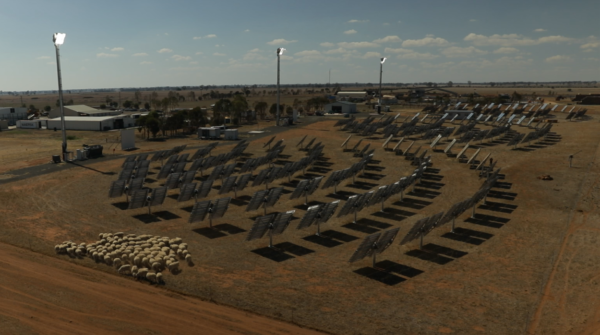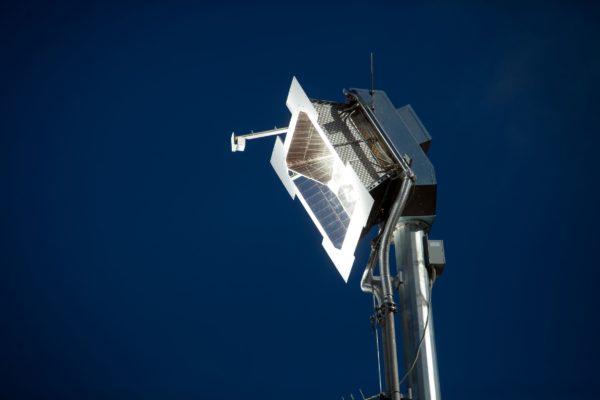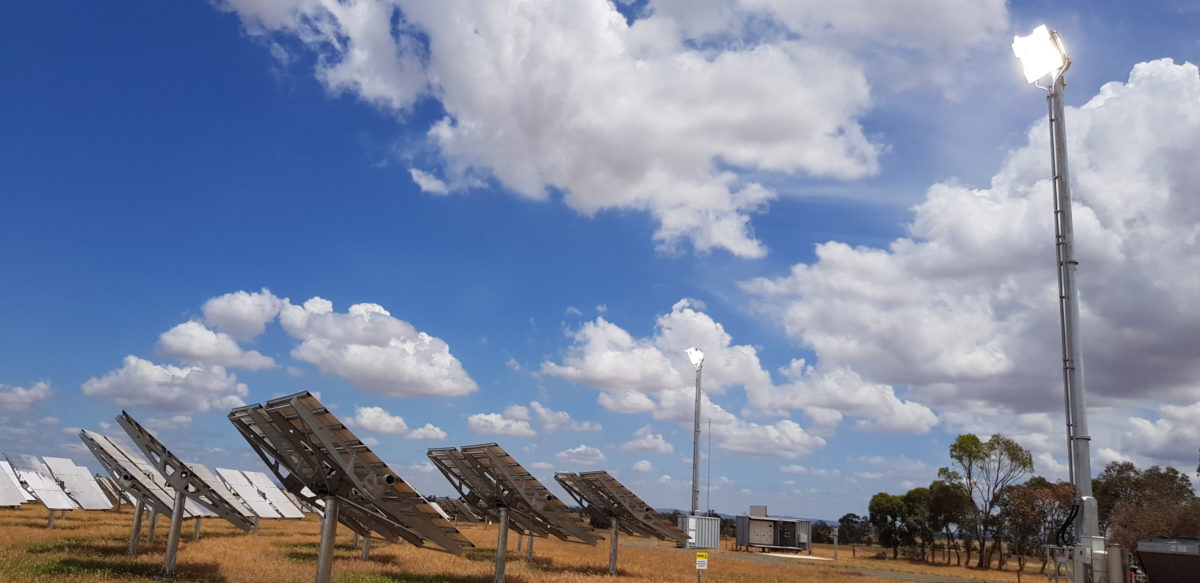Only weeks after receiving a boost in funding from the Australian Renewable Energy Agency (ARENA), Melbourne ‘hydro-solar’ tech company RayGen has received another major fillip with the announcement of equity investment from global developer, Photon Energy NV (Photon).
Photon was highly impressed by RayGen’s unique solar and energy storage technology. The tech is being called a “world-first,” a fully dispatch-able renewable energy facility utilising what RayGen calls PV Ultra, a “solar hydro” concentrated solar and thermal storage technology.
The Melbourne-based startup co-generates renewable energy and large scale storage by focusing sunlight with a field of aligned mirrors, or heliostats, onto a tower-mounted receiver containing an array of PV Ultra modules made of gallium arsenide PV cells. The heat extracted from the PV Ultra modules is then stored in two insulated water reservoirs with a 90°C temperature difference. The ability to co-generate electricity and heat, the latter a captured by-product, makes the whole facility highly efficient.

The PV Ultra receiver contains approximately 400 PV Ultra modules, each generating 2.5kW of electricity and 5kW of heat. This produces 1MW of electricity and 2MW of heat per field setup.

Image: RayGen
The strategic partnership is an opportunity for both companies to develop renewable energy projects worldwide. The first of these developments will be a 100MW/1,000 MWh solar-plus-storage “Thermal Hydro” project, upon which Photon will act as project developer, EPC contractor and, where suitable, equity investor.
“Our investment in RayGen is our first step into the upstream segment of the solar industry and it comes at a crucial time,” said Photon Energy CEO Georg Hotar. “The elimination of solar energy’s intermittency and ensuring its 24-hour availability at grid-competitive cost is the holy grail and RayGen has found it.”
The great potential of RayGen’s technology is in its scalability, the larger the reservoirs, the more storage. But, perhaps the greater advantage of RayGen’s technology is not that it can be scaled up, but that it can be scaled down.
RayGen’s approach to storage is similar to a pumped hydro facility but it can be run out on a much smaller scale and much cheaper to boot. Moreover, thanks to the technology’s high efficiency, PV Ultra can generate the same amount of electricity as a normal facility with only a quarter of the land.
“Our partnership with RayGen will enable us to address a vast new universe of opportunities both on-grid as well as in off-grid remote locations including islands,” continued Hotar. “We are thrilled to be working with RayGen’s team on pushing the boundaries of the solar energy industry in the coming years.”
In a specifically Australian context, Photon Energy Australia noted that its investment and partnership with RayGen is designed to tackle the problem of intermittency in solar energy. Managing Director Michael Gartner noted that “The RayGen PV Ultra module is the most efficient way to convert solar energy into electricity to date. Combining high efficiency concentrated PV generation with thermal absorption and storage, it achieves the highest energy density of any solar technology available today.”
To say that there is excitement about the applicability of this technology is an understatement. ARENA has already funded RayGen with a total of $8.67 million to develop its PV Ultra tech and build the 1 MW PV Ultra pilot project in Newbridge, Victoria. The successful pilot project has been powering a local mushroom farm for two years.
RayGen CEO Richard Payne said he is delighted to be working with Photon Energy. “RayGen has found a strategic partner in Photon Energy who shares our mission to accelerate the clean energy transition,” said Payne. “Moving toward 100 per cent renewable energy will require storage solutions that can store power cost-effectively for hours, days or weeks and be deployed at large scale around the world.”
This content is protected by copyright and may not be reused. If you want to cooperate with us and would like to reuse some of our content, please contact: editors@pv-magazine.com.









1 comment
By submitting this form you agree to pv magazine using your data for the purposes of publishing your comment.
Your personal data will only be disclosed or otherwise transmitted to third parties for the purposes of spam filtering or if this is necessary for technical maintenance of the website. Any other transfer to third parties will not take place unless this is justified on the basis of applicable data protection regulations or if pv magazine is legally obliged to do so.
You may revoke this consent at any time with effect for the future, in which case your personal data will be deleted immediately. Otherwise, your data will be deleted if pv magazine has processed your request or the purpose of data storage is fulfilled.
Further information on data privacy can be found in our Data Protection Policy.